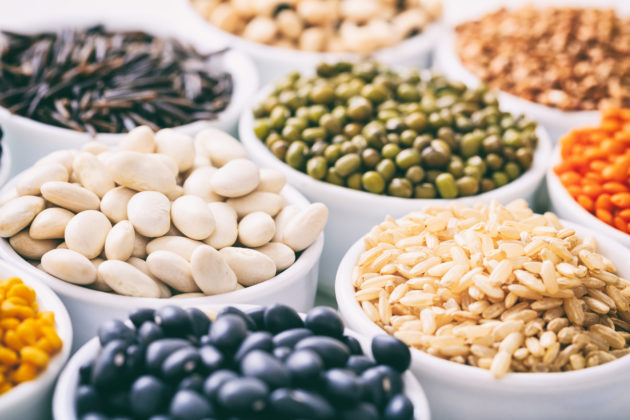Despite their variety, all legumes share common benefits. They are inexpensive, versatile, relatively sustainable and have a long shelf life, making them a perfect pantry staple. Because of their “meaty” texture and protein content, legumes can stand in as a meat substitution for many dishes.
A legume refers to any plant from the Fabaceae family, including its leaves, stems, and pods. Lentils are part of the pulses group that also include peas and beans. A pulse is the edible seed from a legume plant.
Legumes provide a range of essential nutrients including protein, carbohydrates, dietary fiber, minerals and vitamins. Here are some of their nutritional benefits:
- Good source of protein (higher than most other plant foods); have 2x the protein content of grains
- Generally low in fat and almost free of saturated fat; contain no cholesterol
- Contain energy providing carbohydrates; the fiber content slows glucose absorption in the bloodstream which make legumes a “complex carbohydrate,” great for blood sugar management
- Good source of B vitamins (such as folate), iron, zinc, calcium and magnesium
- Low in sodium; canned varieties can be rinsed to reduce up to 41% of the sodium content
- Good source of insoluble and soluble fiber
- Contain phytonutrients, shown to reduce risks of certain cancers
- Contain the essential amino acid lysine (which is low in most grains)
- Gluten free and appropriate for people with Celiac disease or gluten intolerances
Some popular legumes include:
- Black Beans: Can be added to tacos, quesadillas, soups and nachos; can be stir fried with leftover vegetables, cheese or eggs; can be blended with sweet potato for a vegetable burger
- Kidney Beans: A favorite for soups
- Garbanzo Beans aka “Chickpeas”: Great for salads, soups and homemade hummus
At Unidine, legumes and pulses are the main protein sources in our Naturally Nourished program, which is a vegan-based concept that allows customization by our customers and clients to add other ingredients based on their tastes and personal preferences.
By Regional Director of Nutrition Emmie Burke, RD, LDN, CNSC.
Unidine’s network of on-staff nutrition professionals draw on their certified expertise and clinical specialties to develop innovative nutritional programming. At Unidine partnered facilities, 360+ Registered Dietitians work in collaboration with culinarians to foster a holistic approach to regulatory compliance, improved health outcomes and wellness education.

